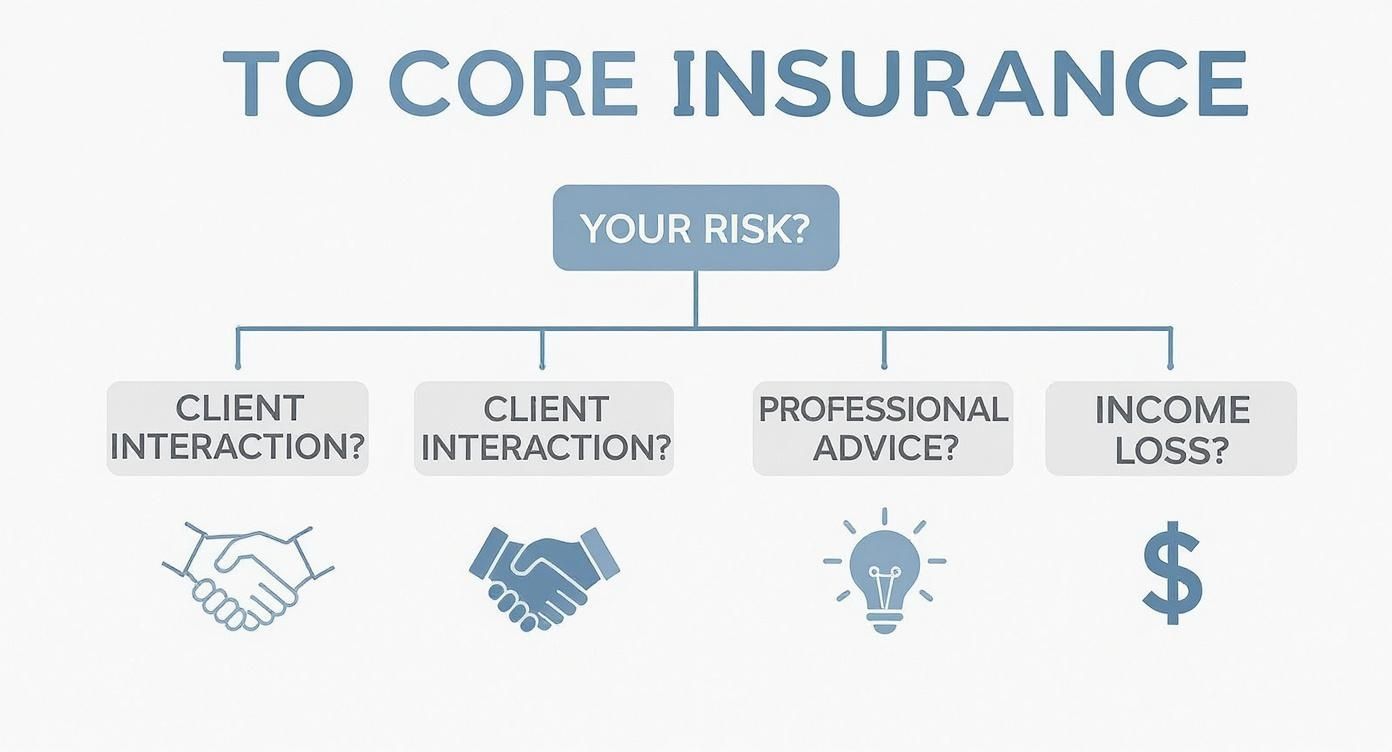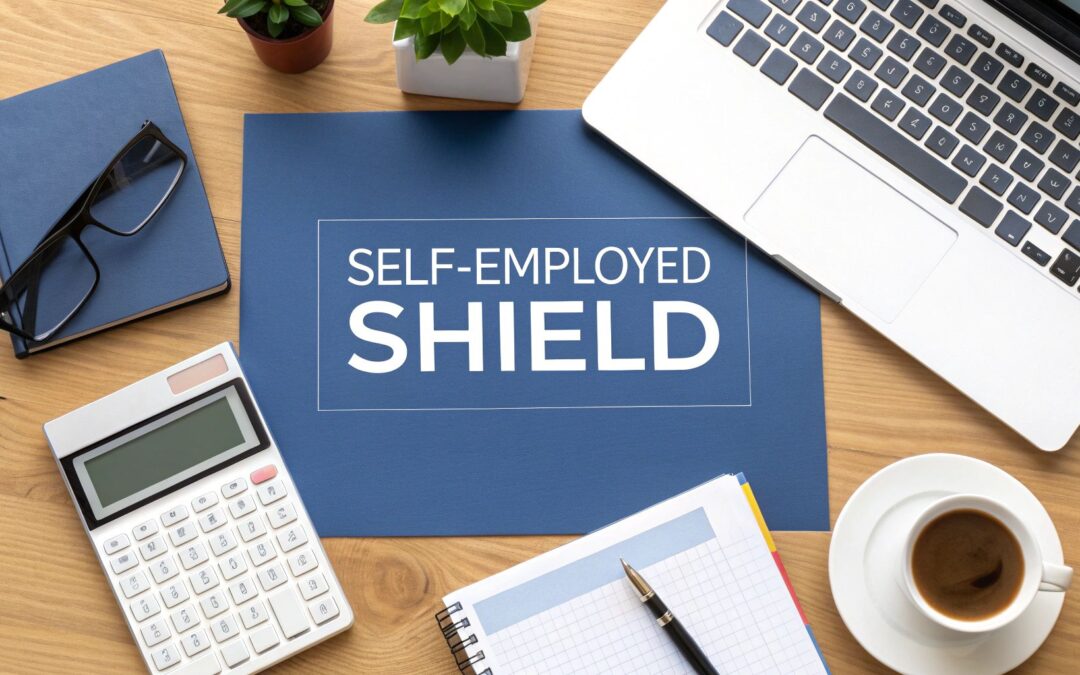The best insurance for a self-employed professional isn't just one policy. It's a smart combination of health, liability, and disability coverage. The right mix for you comes down to your industry, how much you earn, and the unique risks you take on as your own boss.
Why Self-Employed Insurance Is Non-Negotiable

When you make that leap into self-employment, you trade in the corporate safety net for total freedom. But that freedom comes with a catch: the entire weight of your financial protection lands squarely on your shoulders. Your personal homeowners or renters policy just isn't built to handle business risks, leaving you dangerously exposed.
Think about it. If a client slips and falls during a meeting in your home office, or if a mistake in your work ends up costing them a lot of money, your personal policies won't help one bit. The fallout from going uninsured can be absolutely devastating, a reality we dig into in our guide on what happens if you don't have insurance. That's why building a solid insurance strategy isn't just a good idea—it's a non-negotiable cost of doing business.
Understanding Your Unique Risks
Every solo professional has their own set of challenges. A freelance graphic designer's worries are a world away from an independent construction contractor's. The first step to protecting yourself is knowing exactly what you're up against.
- Professional Services Risk: Consultants, writers, and developers all face potential claims of negligence, errors, or omissions in their work.
- Third-Party Risk: If you interact with clients or the public—online or in person—you're exposed to potential lawsuits for property damage or bodily injury.
- Income Interruption Risk: What happens if you get sick or injured and can't work? An unexpected event could stop your income cold, putting both your business and your personal finances in jeopardy.
The Growing Market for Specialized Coverage
Thankfully, the need for this kind of specialized protection is getting more attention. The global small business insurance market hit $17.5 billion in 2021 and is expected to climb to $20.6 billion by 2025. This isn't just a random number; it shows a real shift in awareness as more and more solo pros realize they need coverage built for the way they work.
Insurance for the self-employed isn't just another expense on your spreadsheet. It's the foundation that allows your business to survive the unexpected and truly thrive for the long haul.
Even in highly regulated fields like commercial trucking, specific rules like the FMCSA insurance requirements highlight how critical the right coverage is. No matter the size or industry, your business deserves that same level of protection.
Laying the Foundation: Your Core Insurance Policies
Once you’ve got a handle on the unique risks that come with being your own boss, it's time to build your safety net. Finding the best insurance for self employed professionals isn't about one magic policy. It’s about layering the right coverage to create a solid foundation for your business.
Let’s break down the essentials every solo pro should seriously consider. Think of these as the pillars holding up your business, giving you the confidence to do what you do best.
First Things First: Your Health and Wellbeing
For most freelancers and solo entrepreneurs, health insurance is priority number one. When you don't have an employer plan to fall back on, you're on your own, and that can feel like a huge responsibility. The good news? You have solid options.
The Affordable Care Act (ACA) Marketplace is where most people start. It offers a clear breakdown of plans (Bronze, Silver, Gold, Platinum) and, most importantly, access to income-based tax credits that can make a huge difference in your monthly premiums. For example, a 40-year-old might see an average monthly premium of $541 for a Silver plan, but subsidies could easily drop that cost to around $200.
You can also buy a plan directly from an insurance company or through a broker. These plans don't come with ACA subsidies, but sometimes they offer different networks or benefits. Still, for most self-employed folks, the ACA Marketplace is the most affordable way to get comprehensive health coverage.
When you're self-employed, an unexpected illness or injury doesn't just threaten your health—it threatens your entire business. A solid health insurance plan isn't a luxury; it's one of the smartest investments you can make.
Before we dive into the next policies, here’s a quick overview of the must-have coverage types we’ll be discussing.
Essential Insurance Coverage for Self Employed Professionals
| Insurance Type | What It Covers | Ideal For (Example Professions) |
|---|---|---|
| Health Insurance | Medical, hospital, and prescription drug costs. | Everyone. |
| Professional Liability | Claims of negligence, errors, or mistakes in your work. | Consultants, Designers, Developers, Writers. |
| General Liability | Third-party property damage or bodily injury claims. | Photographers, Event Planners, Consultants. |
| Disability Insurance | A portion of your lost income if you can't work. | All self-employed individuals. |
This table gives you a bird's-eye view, but understanding the "why" behind each one is what really matters. Let's get into the specifics of protecting your professional life.
Shielding Your Hard-Earned Expertise
This one is a biggie. Professional Liability Insurance, also known as Errors & Omissions (E&O) insurance, is what protects you when a client claims you made a mistake or delivered inadequate work. If you provide any kind of service or advice for a living, this is non-negotiable.
Imagine you’re a freelance web developer and you miss a critical deadline, causing your client’s big product launch to be delayed. If they lose revenue because of it, they could sue you for those damages. Without E&O insurance, you’d be footing the bill for lawyers and any potential settlement yourself. It's a scary thought.
This policy is designed to cover:
- Legal Defense Costs: Attorney fees, court costs, and all the related expenses.
- Settlements and Judgments: The money a court orders you to pay or you agree to in a settlement.
- Negligence Claims: Allegations that you didn't meet the professional standard of care.
For anyone from a consultant to a graphic designer, E&O is the policy that stands between a simple mistake and a financial catastrophe.
Covering Real-World Risks and Accidents
While E&O protects your work, General Liability Insurance protects your business from physical-world mishaps—think claims of bodily injury or property damage. If you ever meet with clients in person, visit their offices, or have them come to your home office, this is essential.
Picture this: you're a freelance photographer doing a shoot at a client's house and you accidentally knock over a priceless antique vase. Bam, it shatters. Your General Liability policy would cover the cost to replace it. Or, if a client comes to your home office, trips on a laptop cord, and breaks their wrist, this policy would help with their medical bills and any legal action that follows.
General Liability is the bread-and-butter coverage for the everyday risks of running a business. For a deeper dive, our guide on essential insurance for independent contractors has you covered.
Protecting Your Most Valuable Asset: Your Income
Here’s the question that keeps a lot of us up at night: What happens if you get sick or injured and can’t work for weeks… or months? No work means no income. That’s where Disability Insurance comes in, replacing a portion of your income so you can keep your life on track.
There are two main flavors:
- Short-Term Disability: Usually covers you for a few months up to a year.
- Long-Term Disability: Can step in for several years, sometimes all the way until retirement.
This coverage is so often overlooked, but it's arguably the most critical piece of the entire puzzle. It makes sure your mortgage, bills, and groceries get paid even when you can't bring in any revenue. It’s the ultimate backstop for your financial stability.
Comparing Top Insurance Providers and Platforms
Picking the right insurance provider is just as important as choosing the right type of coverage. The market is flooded with options, and they all start to look the same after a while. But finding the best insurance when you're self-employed means looking past the slick ads and getting into what really matters for your bottom line and your peace of mind.
Let's cut through the noise. We’ll look at the real-world trade-offs between the big players in health insurance, then do the same for liability providers. The goal is to figure out who serves you best—whether you're a gig worker needing coverage for a single project or an established consultant who needs a policy that’s built to last.
Health Insurance: The ACA Marketplace vs Private Brokers
For most self-employed folks, the health insurance journey begins with a fork in the road: do you navigate the government-run Affordable Care Act (ACA) Marketplace, or do you work with a private insurance broker? Both can get you a great plan, but they're built for different people with different needs.
Your first stop should almost always be the ACA Marketplace. Why? One reason: income-based subsidies. The Premium Tax Credit can be a game-changer. For a 40-year-old, the average monthly premium for a Silver plan is $541, but subsidies can slash that cost, often dropping it to $200 or less depending on what you expect to earn this year.
Key Takeaway: If your income qualifies you for a subsidy, the ACA Marketplace is almost always the cheapest way to get comprehensive health coverage. The savings are just too big to pass up.
A private broker, on the other hand, offers a more hands-on, personalized touch. They can show you a wider variety of plans, including "off-marketplace" options you won't find on the government site. This is a solid path if you earn too much for subsidies and want to see plans with different doctor networks or benefits that the Marketplace doesn't feature.
Just remember, any plan you buy outside the Marketplace isn't eligible for those premium tax credits. You’ll be paying the full sticker price, and the difference can be huge.
This decision tree can help you figure out which core insurance policies are most critical based on your business activities.

As you can see, the need for specific liability and income protection policies flows directly from what you do day-to-day.
Comparing Top Liability Insurance Providers
When it comes to protecting your business from lawsuits and accidents, the provider landscape is just as diverse. The right choice really depends on your industry, how you work, and how fast you need to get covered. Let’s put three popular options side-by-side: Next Insurance, Hiscox, and Thimble.
Next Insurance: The Digital-First All-Rounder
Next Insurance built its entire brand on making business insurance quick and painless. Their online platform is designed to get you a quote, a policy, and a certificate of insurance in less than 10 minutes. Seriously.
- Ideal Customer: Tech-savvy freelancers, consultants, and skilled tradespeople (think contractors or personal trainers) who want to bundle a few policies together without any hassle.
- Key Strength: Speed and convenience. They offer customized packages that can include General Liability, Professional Liability, and Commercial Auto insurance, all managed from a slick app.
- Situational Use Case: A freelance marketing consultant needs coverage for their advice (Professional Liability) and for client meetings (General Liability). Next can wrap both into a single, affordable monthly payment, with proof of insurance ready to go instantly.
Hiscox: The Established Expert for Professionals
Hiscox is one of the old guards of the insurance world, and they specialize in professional services. They have decades of experience creating policies for consultants, IT pros, marketers, and other folks who work with their brains.
- Ideal Customer: Established self-employed professionals who care more about specialized, comprehensive coverage than pure speed. This is for the architects, engineers, and management consultants who face complex risks.
- Key Strength: Deeply tailored coverage. Hiscox is fantastic at building Professional Liability (E&O) policies that cover very specific industry risks—the kind of stuff a one-size-fits-all provider might miss.
- Situational Use Case: An independent IT consultant works with sensitive client data and needs a rock-solid policy that includes cyber liability. Hiscox can craft a policy that specifically covers the financial fallout from data breaches and network security failures.
Thimble: The On-Demand Innovator
Thimble is built from the ground up for the gig economy and project-based freelancers. Its defining feature is insane flexibility—you can buy insurance by the hour, day, week, or month.
- Ideal Customer: The event photographer, the handyman, or the freelance musician who only needs coverage for a specific job.
- Key Strength: Unbeatable flexibility. If you have a one-day gig, why pay for a full year of insurance? Thimble’s app lets you get covered on the spot for exactly as long as you need it.
- Situational Use Case: A freelance drone pilot gets hired for a two-day real estate shoot. They can pop open the Thimble app and buy General Liability insurance that only covers those 48 hours, satisfying the client’s request without locking into an expensive annual plan.
Decision Point: Your choice of liability provider should reflect how you run your business. If your work is steady and your risks are consistent, Hiscox or Next Insurance offer stable, comprehensive protection. If your work is project-based and unpredictable, Thimble gives you the cost-effective flexibility you need to survive.
At the end of the day, getting the best insurance for your self-employed venture means understanding these differences. Whether you’re trying to maximize subsidies on the ACA Marketplace or picking a liability insurer that gets your workflow, a little thoughtful comparison goes a long way toward building a secure, resilient business.
Identifying and Closing Critical Coverage Gaps

Getting professional and general liability insurance is a fantastic start. But it's easy to get a false sense of security and stop there. Many freelancers assume these two policies are all they'll ever need, leaving them wide open to risks they never even saw coming.
These blind spots—or coverage gaps—can be just as devastating as having no insurance at all.
Think about it. The modern self-employed world is full of complex risks that a standard policy just wasn't designed for. Your personal car insurance likely won't cover an accident while you're driving to a client's office, and a basic liability plan does nothing if your client data gets hacked. Spotting these gaps is the key to building a business that can actually weather a storm.
This isn't a small problem. An unbelievable 80% of high-earning small and medium enterprises (SMEs) are either underinsured or have no insurance at all. More than half admit they aren't protected against their top three biggest fears, which shows a huge disconnect between what we worry about and what we do about it.
Bundling for Broader Protection with a BOP
One of the smartest ways to fill these common gaps is with a Business Owner's Policy (BOP). A BOP isn't a separate type of insurance; it's a package deal. It bundles several key coverages together, usually for less than you'd pay buying them one by one.
A typical BOP brings together:
- General Liability Insurance: Protects you if a third party claims you caused bodily injury or property damage.
- Commercial Property Insurance: Covers your business gear, from laptops to inventory, whether you rent or own your workspace.
- Business Interruption Insurance: Helps replace lost income if something like a fire or major theft forces you to pause operations.
A Business Owner's Policy is like a pre-packaged safety net. It simplifies everything and closes that classic gap between liability and property damage—a must-have for anyone who relies on their equipment to get work done.
Imagine you're a freelance photographer with $15,000 worth of cameras and lighting in your home office. Your standard homeowner's policy might only cover $2,500 of business property. A BOP would step in to cover the full value of your gear, protecting the tools you need to earn a living.
Addressing Modern Risks: Cyber Liability Insurance
Let's be honest, almost every self-employed pro handles client data—even if it's just email addresses and project notes. That alone creates a massive risk. If your systems are breached and that information is stolen, your general liability policy won't help you at all.
This is exactly why Cyber Liability Insurance exists. It’s designed to cover the very specific and expensive fallout from a data breach, including:
- Notifying all your affected clients
- Paying for credit monitoring services
- Covering legal defense and settlement fees
- Hiring a PR firm to help repair your reputation
For example, a freelance marketing consultant’s project management tool gets hacked, exposing the customer lists for three of their biggest clients. The legal fees and recovery costs could easily hit $50,000. Without cyber liability coverage, an event like that could be a business-ending catastrophe.
When Your Vehicle Is Your Office: Commercial Auto Insurance
Here's one last gap that catches so many people by surprise: your car. If you use your personal vehicle for any business activities—driving to meet clients, hauling equipment, or even just making deliveries—your personal auto policy could deny a claim if you get into an accident.
Commercial Auto Insurance is built to cover vehicles used for work. It offers higher liability limits and protects you from the unique risks that come with being on the road for your business. And while you might have health insurance, a major car accident can create financial problems that go way beyond your own medical bills. Learning about how a gap in medical insurance coverage can expose you makes it clear: closing every potential insurance gap is non-negotiable for a serious professional.
How to Secure the Best Rates for Your Insurance

Finding the right insurance when you're self-employed is one thing; getting it at the right price is a whole other ball game. But lowering your premiums doesn’t mean you have to settle for less coverage. It’s really about positioning yourself as a low-risk client and making smart, strategic choices.
The good news? The market is currently in your favor. The insurance landscape in 2025 is far more competitive than it's been in years, which is great for solo professionals. Insurers have strong capital reserves right now, which is driving up competition and leading to more stable—and sometimes even lower—premiums for certain types of coverage.
Present Yourself as a Low-Risk Professional
Insurers base their rates on one simple thing: risk. The less risky you seem, the lower your premiums will be. You can take control of your risk profile with a few key practices that show you're a pro who's serious about safety.
Start by meticulously documenting everything. This means clear client contracts, detailed project scopes, and a consistent process for how you communicate and deliver your work. An organized business just looks like less of a liability.
Next, keep your claims history clean. You can't undo the past, but preventing future claims is everything. Put industry-specific risk management practices into place—like using safety checklists if you're a photographer on location, or adopting secure data protocols if you're a consultant.
Smart Shopping and Strategic Bundling
Never, ever accept the first quote you receive. Shopping around is the single most effective way to know you're getting a competitive rate. Make it a goal to compare at least three to five different quotes for the same level of coverage. If international travel is part of your business, you can get a quick quote for international private medical insurance to compare options and rates efficiently.
Think about bundling your policies with one provider. Insurers often give you a pretty significant discount when you buy a Business Owner's Policy (BOP), which combines general liability and commercial property insurance. This saves money and cuts down on your admin work. Win-win.
Key Insight: Bundling isn't just a sales gimmick; it’s a strategic move. Insurers reward loyalty because it's more efficient for them to manage one client with multiple policies than several clients with just one each.
Leverage Group Power and Professional Standing
You may be self-employed, but you don't have to go it completely alone. Many professional associations, guilds, and even alumni groups offer their members access to group insurance plans. These plans often come with much lower rates than you could get on your own, thanks to the group's collective buying power.
Look into organizations tied to your industry. For example:
- Freelancers Union: Offers its members access to various insurance products.
- Writers Guild of America: Provides health plan options for its qualifying members.
- Trade-Specific Associations: Groups for designers, developers, or consultants often have partnerships with insurers.
Taking these steps turns you from a passive buyer into an informed one. For more practical advice, check out our guide on https://mypolicyquote.com/2025/09/03/how-to-reduce-insurance-premiums/. By combining a low-risk profile with smart shopping and group discounts, you can get solid coverage that protects your business without breaking the bank.
Common Insurance Questions for the Self-Employed
Stepping into the world of insurance when you're your own boss can feel like trying to solve a puzzle with half the pieces missing. It's totally normal to wonder what you really need, how much it's all going to cost, and where it fits into your financial big picture.
We’ve pulled together the most common questions we hear from freelancers and solo entrepreneurs, along with clear answers to help you feel confident in your decisions. Let's get these questions answered.
Do I Really Need Business Insurance if I Work From Home?
Yes. One hundred percent, yes. This is a huge and often costly misunderstanding for a lot of self-employed people. Your standard homeowner's or renter's policy is built for your personal life, and it almost always has very specific rules that exclude anything related to your business.
Think about it this way: if a client comes over for a meeting and slips on your walkway, your homeowner's policy will likely say, "Sorry, that's a business matter." It also won't cover your essential work gear beyond a tiny limit—often just $2,500. That's rarely enough to replace a professional-grade laptop, let alone camera equipment or other tools you need to do your job.
The Bottom Line: Your home might be your office, but your homeowner's insurance doesn't see it that way. You need a separate business insurance policy to properly protect yourself from accidents (general liability) and your equipment (commercial property).
How Much Does Insurance Cost for a Self-Employed Person?
There’s no magic number here. Insurance costs are incredibly personal because they’re based entirely on your unique situation and the risks you face.
What goes into that final number? A few key things:
- What you do: An IT consultant working with sensitive client data has different risks than a freelance writer. The higher the perceived risk, the higher the premium.
- Where you live: Your state and even your city can have a big impact on costs, especially when it comes to health insurance.
- Your annual revenue: Sometimes, higher earnings can mean higher premiums, because the financial stakes are bigger if a claim is filed against you.
- How much coverage you get: A policy with a $1 million liability limit is naturally going to cost more than one with a $500,000 limit.
To give you a real-world idea, a freelance graphic designer might pay somewhere between $30 and $60 a month for a solid liability package. On the other hand, a self-employed general contractor could easily see costs over $150 a month because their work involves much greater physical risks. The only way to know for sure is to get a few quotes built specifically for you.
Can I Deduct My Insurance Premiums on My Taxes?
Mostly, yes! This is one of the best financial perks of being self-employed. The IRS generally sees insurance as a necessary cost of doing business, which means you can often deduct the premiums you pay, lowering how much you owe in taxes.
This typically includes what you pay for:
- Health, Dental, and Long-Term Care Insurance: You can usually deduct 100% of the premiums for yourself, your spouse, and your dependents.
- Business Insurance: Policies like general liability, professional liability (E&O), and cyber liability are all considered standard business expenses.
- Disability Insurance: Be careful here. Premiums for a policy that covers your business overhead are deductible. Premiums for one that replaces your personal income generally are not.
The best part is that this deduction is taken "above the line," so you don't even have to itemize to claim it. But tax laws can be tricky and are always changing, so it's always a smart move to chat with a tax pro to make sure you're getting it right.
At My Policy Quote, our entire focus is on helping self-employed pros like you find the right coverage without all the confusion. We offer clear, straightforward options so you can build a safety net for your business and your family. Explore your personalized insurance options and get a free quote today.


